- Home
- Bruce Sterling
Schismatrix Plus Page 2
Schismatrix Plus Read online
Page 2
Lindsay brushed a moth from her face and pressed his lips to hers. The pulse stopped in her throat. She was dead.
“Vera,” he groaned. “Sweetheart, you’re burned…”
A wave of grief and exultation hit him. He fell into the sun-warmed grass, holding his sides. More moths sprang up.
She had done it. It seemed easy now. It was something the two of them had talked about a hundred times, deep into the night at the Museum or in bed after their adultery. Suicide, the last protest. An enormous vista of black freedom opened up in Lindsay’s head. He felt a paradoxical sense of vitality. “Darling, it won’t be long…”
His uncle found him kneeling. The older man’s face was gray.
“Oh,” he said. “This is vile. What have you done?”
Lindsay got dizzily to his feet. “Get away from her.”
His uncle stared at the dead woman. “She’s dead! You damned fool, she was only twenty-six!”
Lindsay yanked a long dagger of crudely hammered metal from his accordioned sleeve. He swept it up and aimed it at his own chest. “In the name of humanity! And the preservation of human values! I freely choose to—”
His uncle seized his wrist. They struggled briefly, glaring into one another’s eyes, and Lindsay dropped the knife. His uncle snatched it out of the grass and slipped it into his lab coat. “This is illegal,” he said. “You’ll face weapons charges.”
Lindsay laughed shakily. “I’m your prisoner, but you can’t stop me if I choose to die. Now or later, what does it matter?”
“You’re a fanatic.” His uncle watched him with bitter contempt. “The Shaper schooling holds to the end, doesn’t it? Your training cost the Republic a fortune, and you use it to seduce and murder.”
“She died clean! Better to burn in a rush than live two hundred years as a Mechanist wirehead.”
The elder Lindsay stared at the horde of white moths that swarmed on the dead woman’s clothing. “We’ll nail you for this somehow. You and that upstart plebe Constantine.”
Lindsay was incredulous. “You stupid Mech bastard! Look at her! Can’t you see that you’ve killed us already? She was the best of us! She was our muse.”
His uncle frowned. “Where did all these insects come from?” He bent and brushed the moths aside with wrinkled hands.
Lindsay reached forward suddenly and snatched a filigreed gold locket from the woman’s neck. His uncle grabbed his sleeve.
“It’s mine!” Lindsay shouted. They began to fight in earnest. His uncle broke Lindsay’s clumsy stranglehold and kicked Lindsay twice in the stomach. Lindsay fell to his knees.
His uncle picked up the locket, wheezing. “You assaulted me,” he said, scandalized. “You used violence against a fellow citizen.” He opened the locket. A thick oil ran out onto his fingers.
“No message?” he said in surprise. He sniffed at his fingers. “Perfume?”
Lindsay knelt, panting in nausea. His uncle screamed.
White moths were darting at the man, clinging to the oily skin of his hands. There were dozens of them.
They were attacking him. He screamed again and batted at his face.
Lindsay rolled over twice, away from his uncle. He knelt in the grass, shaking. His uncle was down, convulsing like an epileptic. Lindsay scrambled backward on his hands and knees.
The old man’s wrist monitor glared red. He stopped moving. The white moths crawled over his body for a few moments, then flew off one by one, vanishing into the grass.
Lindsay lurched to his feet. He looked behind him, across the meadow. His wife was walking toward them, slowly, through the grass.
Chapter 1
THE MARE TRANQUILLITATIS PEOPLE’S CIRCUMLUNAR ZAIBATSU: 27-12-’15
They shipped Lindsay into exile in the cheapest kind of Mechanist drogue. For two days he was blind and deaf, stunned with drugs, his body packed in a thick matrix of deceleration paste.
Launched from the Republic’s cargo arm, the drogue had drifted with cybernetic precision into the polar orbit of another circumlunar. There were ten of these worlds, named for the lunar mares and craters that had provided their raw materials. They’d been the first nation-states to break off all relations with the exhausted Earth. For a century their lunar alliance had been the nexus of civilization, and commercial traffic among these “Concatenate worlds” had been heavy.
But since those glory days, progress in deeper space had eclipsed the Concatenation, and the lunar neighborhood had become a backwater. Their alliance had collapsed, giving way to peevish seclusion and technical decline. The circumlunars had fallen from grace, and none had fallen further than the place of Lindsay’s exile.
Cameras watched his arrival. Ejected from the drogue’s docking port, he floated naked in the free-fall customs chamber of the Mare Tranquillitatis People’s Circumlunar Zaibatsu. The chamber was of dull lunar steel, with strips of ragged epoxy where paneling had been ripped free. The room had once been a honeymoon suite, where newlyweds could frolic in free-fall. Now it was bleakly transformed into a bureaucratic clearing area.
Lindsay was still drugged from the trip. A drip-feed cable was plugged into the crook of his right arm, reviving him. Black adhesive disks, biomonitors, dotted his naked skin. He shared the room with a camera drone. The free-fall videosystem had two pairs of piston-driven cybernetic arms.
Lindsay’s gray eyes opened blearily. His handsome face, with its clear pale skin and arched, elegant brows, had the slack look of stupor. His dark, crimped hair fell to high cheekbones with traces of three-day-old rouge.
His arms trembled as the stimulants took hold. Then, abruptly, he was back to himself. His training swept over him in a physical wave, flooding him so suddenly that his teeth clacked together in the spasm. His eyes swept the room, glittering with unnatural alertness. The muscles of his face moved in a way that no human face should move, and suddenly he was smiling. He examined himself and smiled into the camera with an easy, tolerant urbanity.
The air itself seemed to warm with the sudden radiance of his good-fellowship.
The cable in his arm disengaged itself and snaked back into the wall. The camera spoke.
“You are Abelard Malcolm Tyler Lindsay? From the Mare Serenitatis Circumlunar Corporate Republic? You are seeking political asylum? You have no biologically active materials in your baggage or implanted on your person? You are not carrying explosives or software attack systems? Your intestinal flora has been sterilized and replaced with Zaibatsu standard microbes?”
“Yes, that’s correct,” Lindsay said, in the camera’s own Japanese. “I have no baggage.” He was comfortable with the modern form of the language: a streamlined trade patois, stripped of its honorific tenses. Facility with languages had been part of his training.
“You will soon be released into an area that has been ideologically decriminalized,” the camera said. “Before you leave customs, there are certain limits to your activities that must be understood. Are you familiar with the concept of civil rights?”
Lindsay was cautious. “In what context?”
“The Zaibatsu recognizes one civil right: the right to death. You may claim your right at any time, under any circumstances. All you need do is request it. Our audio monitors are spread throughout the Zaibatsu. If you claim your right, you will be immediately and painlessly terminated. Do you understand?”
“I understand,” Lindsay said.
“Termination is also enforced for certain other behaviors,” the camera said. “If you physically threaten the habitat, you will be killed. If you interfere with our monitoring devices, you will be killed. If you cross the sterilized zone, you will be killed. You will also be killed for crimes against humanity.”
“Crimes against humanity?” Lindsay said. “How are those defined?”
“These are biological and prosthetic efforts that we declare to be aberrant. The technical information concerning the limits of our tolerance must remain classified.”
“I see,” Lindsay s
aid. This was, he realized, carte blanche to kill him at any time, for almost any reason. He had expected as much. This world was a haven for sundogs: defectors, traitors, exiles, outlaws. Lindsay doubted that a world full of sundogs could be run any other way. There were simply too many strange technologies at large in circumsolar space. Hundreds of apparently innocent actions, even the breeding of butterflies, could be potentially lethal.
We are all criminals, he thought.
“Do you wish to claim your civil right?”
“No, thank you,” Lindsay said politely. “But it’s a great solace to know that the Zaibatsu government grants me this courtesy. I will remember your kindness.”
“You need only call out,” the camera said, with satisfaction.
The interview was over. Wobbling in free-fall, Lindsay stripped away the biomonitors. The camera handed him a credit card and a pair of standard-issue Zaibatsu coveralls.
Lindsay climbed into the baggy clothing. He’d come into exile alone. Constantine, too, had been indicted, but Constantine, as usual, had been too clever.
Constantine had been his closest friend for fifteen years. Lindsay’s family had disapproved of his friendship with a plebe, but Lindsay had defied them.
In those days the elders had hoped to walk the fence between the competing superpowers. They’d been inclined to trust the Shapers and had sent Lindsay to the Ring Council for diplomatic training. Two years later, they’d sent Constantine as well, for training in biotechnology.
But the Mechanists had overwhelmed the Republic, and Lindsay and Constantine were disgraced, embarrassing reminders of a failure in foreign policy. But this only united them, and their dual influence had spread contagiously among the plebes and the younger aristos. In combination they’d been formidable: Constantine, with his subtle long-term plans and iron determination; Lindsay as the front man, with his persuasive glibness and theatrical elegance.
But then Vera Kelland had come between them. Vera: artist, actress, and aristocrat, the first Preservationist martyr. Vera believed in their cause; she was their muse, holding to the conviction with an earnestness they couldn’t match. She too was married, to a man sixty years her senior, but adultery only added spice to the long seduction. At last Lindsay had won her. But with the possession of Vera came her deadly resolve.
The three of them knew that an act of suicide would change the Republic when all else was hopeless. They came to terms. Philip would survive to carry on the work; that was his consolation for losing Vera and for the loneliness that was to come. And the three of them had worked toward death in feverish intimacy, until her death had truly come, and made their sleek ideals into a sticky nastiness.
The camera opened the customs hatch with a creak of badly greased hydraulics. Lindsay shook himself free of the past. He floated down a stripped hallway toward the feeble glow of daylight.
He emerged onto a landing pad for aircraft, cluttered with dirty machines.
The landing pad was centered at the free-fall zone of the colony’s central axis. From this position, Lindsay could stare along the length of the Zaibatsu, through five long kilometers of gloomy, stinking air.
The sight and shape of the clouds struck him first. They were malformed and bloated, with an ugly yellowish tinge. They rippled and distorted in fetid updrafts from the Zaibatsu’s land panels.
The smell was vile. Each of the ten circumlunar worlds of the Concatenation had its own native smell. Lindsay remembered that his own Republic had seemed to reek when he first returned to it from the Shaper academy. But here the air seemed foul enough to kill. His nose began to run.
Every Concatenate world faced biological problems as the habitat aged.
Fertile soil required a minimum of ten million bacterial cells per cubic centimeter. This invisible swarm formed the basis of everything fruitful. Humanity had carried it into space.
But humanity and its symbionts had thrown aside the blanket of atmosphere. Radiation levels soared. The circumlunar worlds had shields of imported lunar rubble whole meters deep, but they could not escape the bursts of solar flares and the random shots of cosmic radiation.
Without bacteria, the soil was a lifeless heap of imported lunar dust. With them, it was a constant mutational hazard.
The Republic struggled to control its Sours. In the Zaibatsu, the souring had become epidemic. Mutant fungi had spread like oil slicks, forming a mycelial crust beneath the surface of the soil. This gummy crust repelled water, choking trees and grass. Dead vegetation was attacked by rot. The soil grew dry, the air grew damp, and mildew blossomed on dying fields and orchards, gray pinheads swarming into blotches of corruption, furred like lichen…
When matters reached this stage, only desperate efforts could restore the world. It would have to be evacuated, all its air decompressed into space, and the entire inner surface charred clean in vacuum, then reseeded from scratch. The expense was crippling. Colonies faced with this had suffered breakaways and mass defections, in which thousands fled to frontiers of deeper space. With the passage of time, these refugees had formed their own societies. They joined the Mechanist cartels of the Asteroid Belt, or the Shaper Ring Council, orbiting Saturn.
In the case of the People’s Zaibatsu, most of the population had gone, but a stubborn minority refused defeat.
Lindsay understood. There was a grandeur in this morose and rotting desolation.
Slow whirlwinds tore at the gummy soil, spilling long tendrils of rotten grit into the twilit air. The glass sunlight panels were coated with filth, a gluey amalgam of dust and mildew. The long panels had blown out in places; they were shored up with strut-braced makeshift plugs.
It was cold. With the glass so filthy, so cracked, with daylight reduced to a smeared twilight, they would have to run the place around the clock simply to keep it from freezing. Night was too dangerous; it couldn’t be risked. Night was not allowed.
Lindsay scrabbled weightlessly along the landing deck. The aircraft were moored to the scratched metal with suction cups. There were a dozen man-powered models, in bad repair, and a few battered electrics.
He checked the struts of an ancient electric whose fabric wings were stenciled with a Japanese carp design. Mud-smeared skids equipped it for gravity landings. Lindsay floated into the skeletal saddle, fitting his cloth-and-plastic shoes into the stirrups.
He pulled his credit card from one of the coverall’s chest pockets. The gold-trimmed black plastic had a red LED readout displaying credit hours. He fed it into a slot and the tiny engine hummed into life.
He cast off and caught a downdraft until he felt the tug of gravity. He oriented himself with the ground below.
To his left, the sunlight panel had been cleaned in patches. A cadre of lumpy robots were scraping and mopping the fretted glass. Lindsay nosed the ultralight down for a closer look. The robots were bipedal; they were crudely designed. Lindsay realized suddenly that they were human beings in suits and gas masks.
Columns of sunlight from the clean glass pierced the murk like searchlights. He flew into one, twisted, and rode its updraft.
The light fell upon the opposite land panel. Near its center a cluster of storage tanks dotted the land. The tanks brimmed with oozing green brew: algae. The last agriculture left in the Zaibatsu was an oxygen farm.
He swooped lower over the tanks. Gratefully, he breathed the enriched air. His aircraft’s shadow flitted over a jungle of refinery pipes.
As he looked down, he saw a second shadow behind him. Lindsay wheeled abruptly to his right.
The shadow followed his movement with cybernetic precision. Lindsay pulled his craft into a steep climb and twisted in the seat to look behind him.
When he finally spotted his pursuer, he was shocked to see it so close. Its splattered camouflage of dun and gray hid it perfectly against the interior sky of ruined land panels. It was a surveillance craft, a remotely controlled flying drone. It had flat, square wings and a noiseless rear propeller in a camouflaged exhaust cowling.
A knobbed array of cylinders jutted from the robot aircraft’s torso. The two tubes that pointed at him might be telephoto cameras. Or they might be x-ray lasers. Set to the right frequency, an x-ray laser could char the interior of a human body without leaving a mark on the skin. And x-ray beams were invisible.
The thought filled him with fear and profound disgust. Worlds were frail places, holding precious air and warmth against the hostile nothingness of space. The safety of worlds was the universal basis of morality. Weapons were dangerous, and that made them vile. In this sundog world, only weapons could keep order, but he still felt a deep, instinctive outrage.
Lindsay flew into a yellowish fog that roiled and bubbled near the Zaibatsu’s axis. When he emerged, the aircraft had vanished.
He would never know when they were watching. At any moment, unseen fingers might close a switch, and he would fall.
The violence of his feelings surprised him. His training had seeped away. There flashed behind his eyes the uncontrollable image of Vera Kelland, plunging downward, smashing to earth, her craft’s bright wings crumpling on impact…
He turned south. Beyond the ruined panels he saw a broad ring of pure white, girdling the world. It abutted the Zaibatsu’s southern wall.
He glanced behind him. The northern wall was concave, crowded with abandoned factories and warehouses. The bare southern wall was sheer and vertical. It seemed to be made of bricks.
The ground below it was a wide ring of blazingly clean, raked white rocks. Here and there among the sea of pebbles, enigmatically shaped boulders rose like dark islands.
Lindsay swooped down for a closer look. A squat guardline of black weapons bunkers swiveled visibly, tracking him with delicate bluish muzzles. He was over the Sterilized Zone.
He climbed upward rapidly.
A hole loomed in the center of the southern wall. Surveillance craft swarmed like hornets in and around it. Microwave antennae bristled around its edges, trailing armored cables.
He could not see through the hole. There was half a world beyond that wall, but sundogs were not allowed to glimpse it.

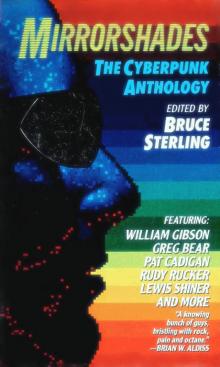 Mirrorshades: The Cyberpunk Anthology
Mirrorshades: The Cyberpunk Anthology The Wonderful Power of Storytelling
The Wonderful Power of Storytelling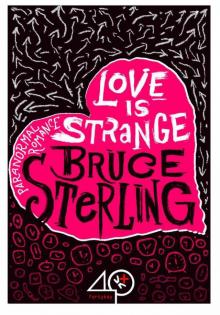 Love Is Strange (A Paranormal Romance)
Love Is Strange (A Paranormal Romance)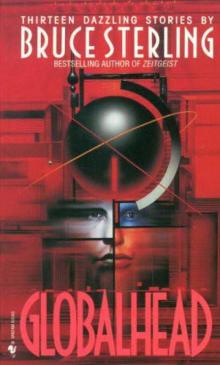 Globalhead
Globalhead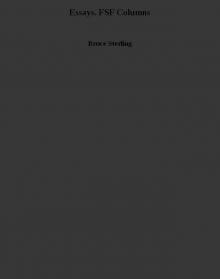 Essays. FSF Columns
Essays. FSF Columns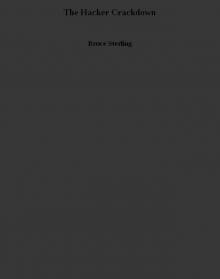 The Hacker Crackdown
The Hacker Crackdown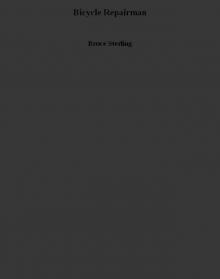 Bicycle Repairman
Bicycle Repairman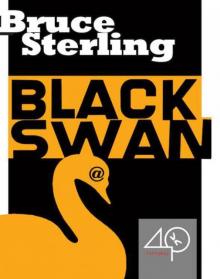 Black Swan
Black Swan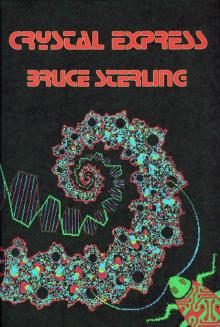 Crystal Express
Crystal Express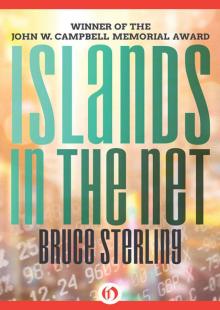 Islands in the Net
Islands in the Net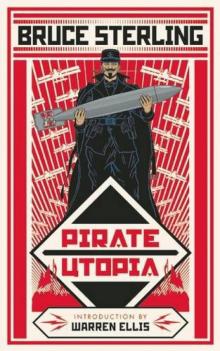 Pirate Utopia
Pirate Utopia GURPS' LABOUR LOST
GURPS' LABOUR LOST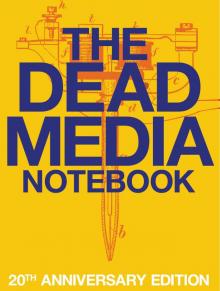 The Dead Media Notebook
The Dead Media Notebook Unstable Networks
Unstable Networks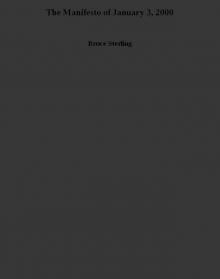 The Manifesto of January 3, 2000
The Manifesto of January 3, 2000 Heavy Weather
Heavy Weather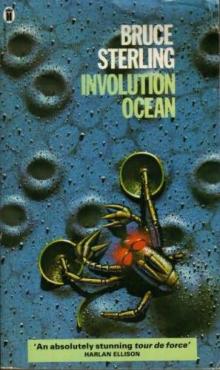 Involution Ocean
Involution Ocean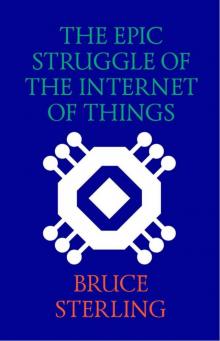 The Epic Struggle of the Internet of Things
The Epic Struggle of the Internet of Things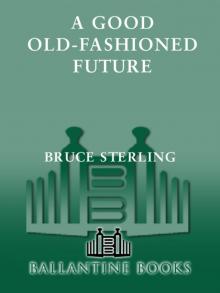 A Good Old-Fashioned Future
A Good Old-Fashioned Future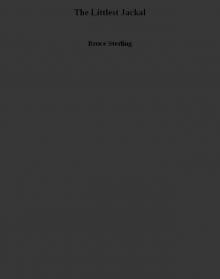 The Littlest Jackal
The Littlest Jackal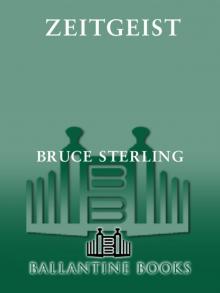 Zeitgeist
Zeitgeist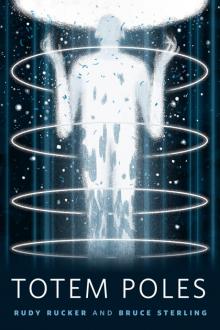 Totem Poles
Totem Poles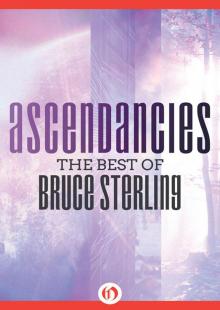 Ascendancies
Ascendancies CyberView 1991
CyberView 1991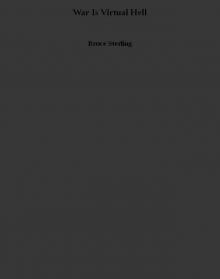 War Is Virtual Hell
War Is Virtual Hell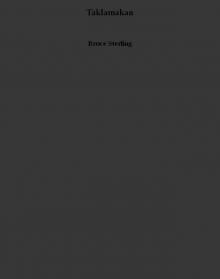 Taklamakan
Taklamakan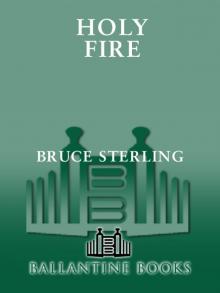 Holy Fire
Holy Fire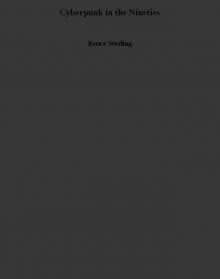 Cyberpunk in the Nineties
Cyberpunk in the Nineties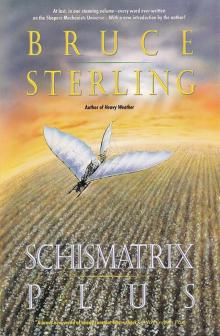 Schismatrix Plus
Schismatrix Plus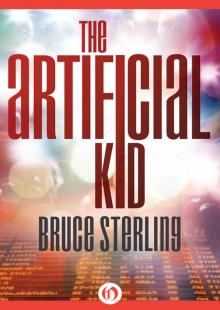 The Artificial Kid
The Artificial Kid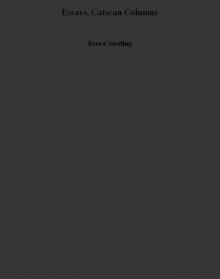 Essays. Catscan Columns
Essays. Catscan Columns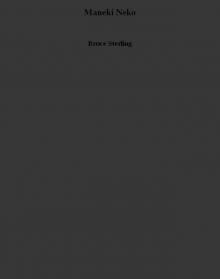 Maneki Neko
Maneki Neko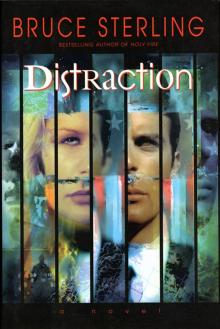 Distraction
Distraction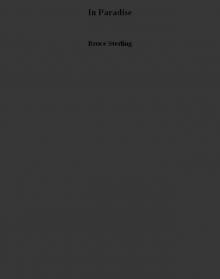 In Paradise
In Paradise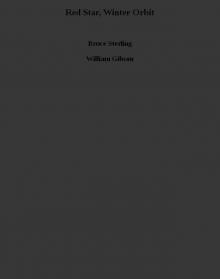 Red Star, Winter Orbit
Red Star, Winter Orbit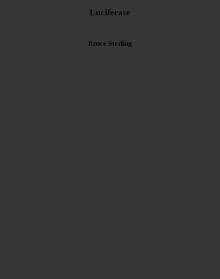 Luciferase
Luciferase